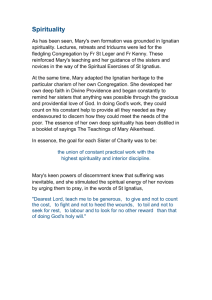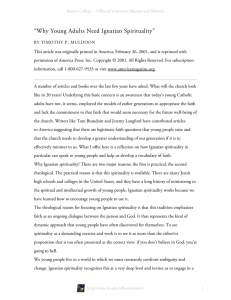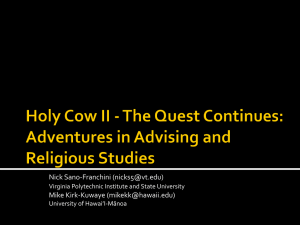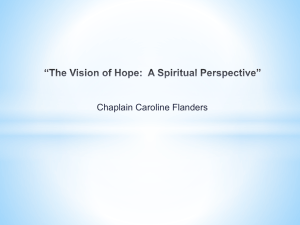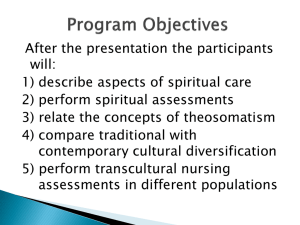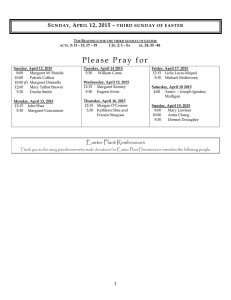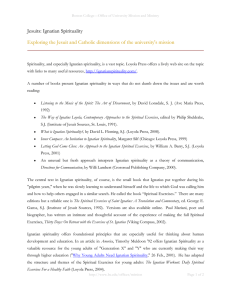Why Young Adults Need Ignatian Spirituality
advertisement
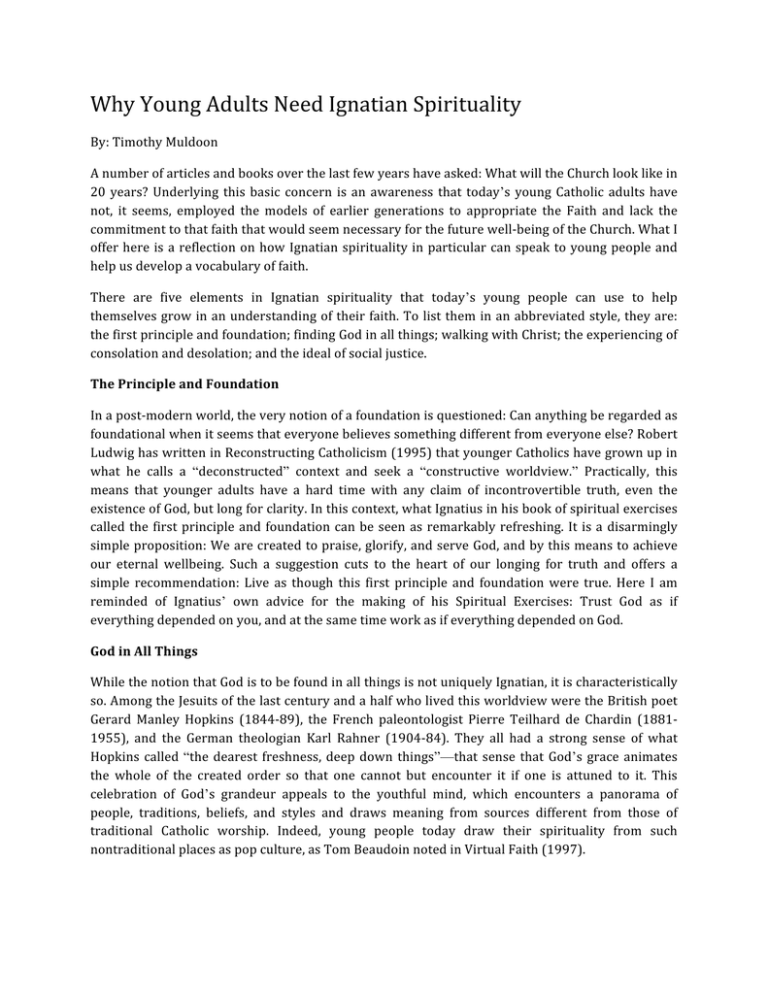
Why Young Adults Need Ignatian Spirituality By: Timothy Muldoon A number of articles and books over the last few years have asked: What will the Church look like in 20 years? Underlying this basic concern is an awareness that today’s young Catholic adults have not, it seems, employed the models of earlier generations to appropriate the Faith and lack the commitment to that faith that would seem necessary for the future well‐being of the Church. What I offer here is a reflection on how Ignatian spirituality in particular can speak to young people and help us develop a vocabulary of faith. There are five elements in Ignatian spirituality that today’s young people can use to help themselves grow in an understanding of their faith. To list them in an abbreviated style, they are: the first principle and foundation; finding God in all things; walking with Christ; the experiencing of consolation and desolation; and the ideal of social justice. The Principle and Foundation In a post‐modern world, the very notion of a foundation is questioned: Can anything be regarded as foundational when it seems that everyone believes something different from everyone else? Robert Ludwig has written in Reconstructing Catholicism (1995) that younger Catholics have grown up in what he calls a “deconstructed” context and seek a “constructive worldview.” Practically, this means that younger adults have a hard time with any claim of incontrovertible truth, even the existence of God, but long for clarity. In this context, what Ignatius in his book of spiritual exercises called the first principle and foundation can be seen as remarkably refreshing. It is a disarmingly simple proposition: We are created to praise, glorify, and serve God, and by this means to achieve our eternal wellbeing. Such a suggestion cuts to the heart of our longing for truth and offers a simple recommendation: Live as though this first principle and foundation were true. Here I am reminded of Ignatius’ own advice for the making of his Spiritual Exercises: Trust God as if everything depended on you, and at the same time work as if everything depended on God. God in All Things While the notion that God is to be found in all things is not uniquely Ignatian, it is characteristically so. Among the Jesuits of the last century and a half who lived this worldview were the British poet Gerard Manley Hopkins (1844‐89), the French paleontologist Pierre Teilhard de Chardin (1881‐ 1955), and the German theologian Karl Rahner (1904‐84). They all had a strong sense of what Hopkins called “the dearest freshness, deep down things”—that sense that God’s grace animates the whole of the created order so that one cannot but encounter it if one is attuned to it. This celebration of God’s grandeur appeals to the youthful mind, which encounters a panorama of people, traditions, beliefs, and styles and draws meaning from sources different from those of traditional Catholic worship. Indeed, young people today draw their spirituality from such nontraditional places as pop culture, as Tom Beaudoin noted in Virtual Faith (1997). To speak about finding God in all things is to admit that no doctrine, no tradition, and no Scripture can exhaust the mystery that is God. It is to remember that our theology, our prayer, and our teaching are limited in their ability to convey this mystery, and that as a result we must ultimately stand in awe before God. We who have grown up in a pluralistic world have seen good things in people of varied backgrounds; we know that any talk of ultimate truth must be humble before the vastness of human experience and of creation. On the flip side, to speak of God in all things is to remind us that ours is a sacramental understanding of God—God among us in the faces, the words, and the gestures that make present the reality of grace. It is to emphasize that God is not distant and “other,” but present and intimate with us. It is to underscore a belief that our lives are not beyond the scope of God’s love, but rather they are already the objects of God’s care. Walking With Christ Ignatius’ Spiritual Exercises, a handbook for the making of a retreat, asks the retreatants to enter deeply into the stories of Jesus’ life and to use their imaginations to place themselves in the Gospel scenes. This is a spirituality about sharing in the story, not only by remembering it but also by taking part in it, in order that one might more fully come to know Jesus. Today, this counsel is still valuable for young people, many of whom know the Gospels only secondhand. I have often heard people say how surprised they were by the Jesus of the Gospels, because they had never had the chance to meet him directly. Too often, young men and women rely on the faith of their parents and never have the opportunity to confront for themselves this attractive figure (“Who do you say that I am?”) and to answer the fundamental call: “Come, follow me.” Young adults undergo a period of distancing themselves from their parents, and part of this distancing involves religion. They need, therefore, the chance to develop their own mature faith. Asking them to consider the real Jesus can be an important step in this growth. Consolation and Desolation It is important on this spiritual journey for young people to understand that this is not a straight, easy path toward enlightenment, but rather a struggle that involves highs and lows. Ignatius’ teaching about what he calls the discernment of spirits is helpful, because it helps us understand that both consolation and desolation are part of the life of faith. Ignatius reminds us that God loves us deeply, but also moves us toward growth even when we think he is distant. In short, Ignatius shows us that spiritual suffering is part of the life of faith and that it forces us to confront the false images of God that prevent us from growing as human beings. For young people this is a hard message, but very necessary in a culture that tells us that all suffering is to be avoided. My generation has grown up in a sound‐bite, throw‐away culture. We have learned that it is possible to insulate ourselves from reality by turning our short attention span to the next interesting thing. We need a spirituality that emphasizes that faith sometimes requires us to confront reality and to trust God even when God is hard to understand—for example, in the face of such mysteries as the death of a loved one or experiences of failure and loss. Social Justice An important final element in Ignatian spirituality that distinguishes it from so many self‐help spiritualities in the marketplace is that of social justice. Jesuit education has stressed that Christian faith reaches out to others and does not rest content with a doctrine of personal fulfillment. Although young people today are criticized for self‐centeredness, many of us long to make a difference for the better in the world. Having inherited an individualistic worldview, we find that it can be difficult but rewarding to show concern for others. One benefit of living in a pluralistic world is that we have come to appreciate the legitimate differences among people, and so we have a sense that all people share a basic moral equality. We must be reminded, though, that in spite of our culture’s tendencies to exalt the individual, we are called to a concern for those people who have been left out. Timothy P. Muldoon is the author of The Ignatian Workout: Daily Spiritual Exercises for a Healthy Faith, and the Director of The Church in the 21st Century Center. Reprinted with permission from America, Vol. 184, No. 6, February 26, 2001.

